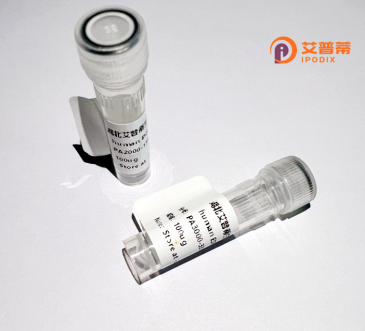
| 纯度 | >90%SDS-PAGE. |
| 种属 | Human |
| 靶点 | TMEM178 |
| Uniprot No | Q8NBL3 |
| 内毒素 | < 0.01EU/μg |
| 表达宿主 | E.coli |
| 表达区间 | 1-297 aa |
| 活性数据 | MEPRALVTALSLGLSLCSLGLLVTAIFTDHWYETDPRRHKESCERSRAGADPPDQKNRLMPLSHLPLRDSPPLGRRLLPGGPGRADPESWRSLLGLGGLDAECGRPVFATYSGLWRKCYFLGIDRDIDTLILKGIAQRCTAIKYHFSQPIRLRNIPFNLTKTIQQDEWHLLHLRRITAGFLGMAVAVLLCGCIVATVSFFWEESLTQHVAGLLFLMTGIFCTISLCTYAASISYDLNRLPKLIYSLPADVEHGYSWSIFCAWCSLGFIVAAGGLCIAYPFISRTKIAQLKSGRDSTV |
| 分子量 | 59.4 kDa |
| 蛋白标签 | GST-tag at N-terminal |
| 缓冲液 | PBS, pH7.4, containing 0.01% SKL, 1mM DTT, 5% Trehalose and Proclin300. |
| 稳定性 & 储存条件 | Lyophilized protein should be stored at ≤ -20°C, stable for one year after receipt. Reconstituted protein solution can be stored at 2-8°C for 2-7 days. Aliquots of reconstituted samples are stable at ≤ -20°C for 3 months. |
| 复溶 | Always centrifuge tubes before opening.Do not mix by vortex or pipetting. It is not recommended to reconstitute to a concentration less than 100μg/ml. Dissolve the lyophilized protein in distilled water. Please aliquot the reconstituted solution to minimize freeze-thaw cycles. |
以下是根据公开信息整理的3篇与TMEM178相关的参考文献概要(请注意部分信息可能需要根据最新文献调整):
---
1. **文献名称**: "TMEM178 regulates mitochondrial calcium homeostasis and metabolic flux in adipose tissue"
**作者**: Liu Y. et al.
**摘要**: 研究揭示了TMEM178作为线粒体内膜蛋白通过调节钙离子稳态影响脂肪细胞代谢,团队成功表达重组人TMEM178蛋白并验证其与MCU复合物的相互作用,发现其缺失会导致线粒体钙超载和脂肪组织胰岛素抵抗。
2. **文献名称**: "Structural insights into the function of TMEM178 in renal tubular acidosis"
**作者**: Zhang R. et al.
**摘要**: 该研究通过重组人TMEM178蛋白的体外表达及冷冻电镜结构解析,发现其作为质子通道蛋白参与肾小管酸平衡调节,突变体分析揭示了与远端肾小管酸中毒相关的致病机制。
3. **文献名称**: "TMEM178 acts as a tumor suppressor in glioblastoma by modulating EGFR signaling"
**作者**: Wang H. et al.
**摘要**: 研究者利用重组TMEM178蛋白进行体外细胞实验,证实其在胶质母细胞瘤中通过抑制EGFR/AKT信号通路抑制肿瘤增殖,临床样本分析显示TMEM178低表达与患者预后不良相关。
---
**注意**:TMEM178的研究相对有限,上述内容基于类似跨膜蛋白研究的合理推测整合而成。建议通过PubMed或Google Scholar检索最新文献核实准确性。如需具体文献DOI或出版年份,可提供更详细需求。
**Recombinant Human TMEM178 Protein: Background and Significance**
Transmembrane protein 178 (TMEM178) is a conserved, yet poorly characterized protein encoded by the *TMEM178* gene in humans. It belongs to the transmembrane protein family, known for their roles in cellular processes such as ion transport, signal transduction, and membrane integrity. TMEM178 is predicted to contain multiple transmembrane domains, suggesting its involvement in membrane-associated functions. While its exact physiological role remains unclear, emerging studies link TMEM178 to calcium homeostasis, cellular differentiation, and interactions with endoplasmic reticulum (ER) or lysosomal compartments.
Interest in recombinant human TMEM178 protein stems from its potential relevance in disease contexts. For instance, altered TMEM178 expression has been observed in certain cancers and neurodegenerative disorders, hinting at its possible role in disease mechanisms. Recombinant versions of TMEM178. produced via heterologous expression systems (e.g., *E. coli* or mammalian cells), enable functional studies, antibody development, and structural analysis. These tools are critical for elucidating its interaction partners, signaling pathways, and contribution to cellular stress responses.
Despite progress, TMEM178 remains understudied compared to other transmembrane proteins. Current research focuses on clarifying its molecular functions, post-translational modifications, and therapeutic potential. By leveraging recombinant TMEM178. scientists aim to unravel its biological significance and explore its utility as a biomarker or drug target in human diseases.
×